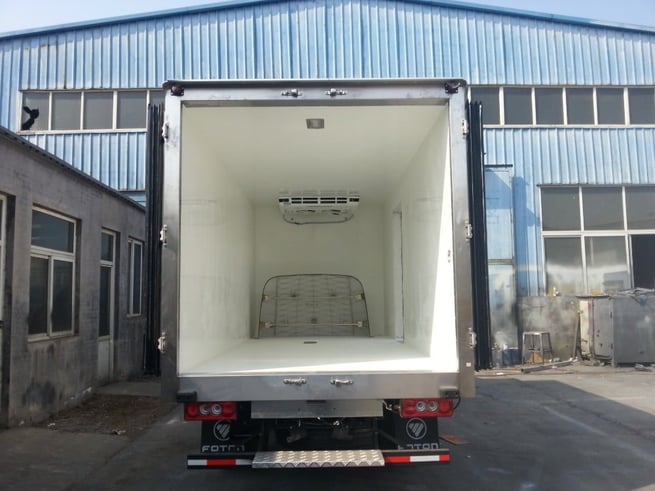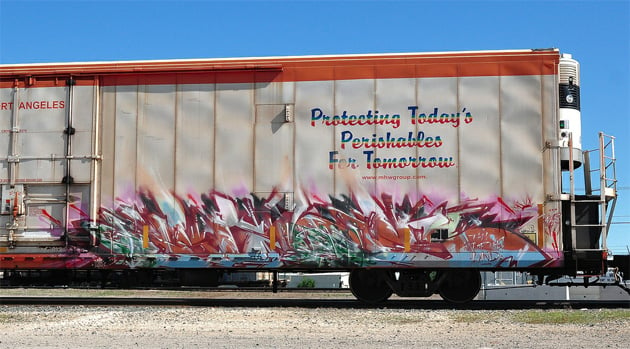REDWOOD LOGIN
Redwood PortalLTL
SCS
SCS Support
Rockfarm
If you have sensitive freight that needs to stay in a temperature-controlled environment, you need a refrigerated transport system with a service-oriented LTL carrier. However, refrigerated shipments can be complex, with a number of limitations and concerns. Because of these intricacies, it’s important that you understand what refrigerated shipments are, how you can use them, and how you can interact with your refrigerated LTL carrier.
 Also called “reefers,” refrigerated trucks create a controlled atmosphere within the truck to protect contents from external temperature changes. Often, these trailers have insulated walls, heavy-duty door seals, and even a reflective roof to absorb the sun’s rays. This keeps the content inside from deteriorating, perishing, or damaging. These trucks will maintain a temperature range rather than a specific degree as a means of shipping multiple types of products in the same trailer.
Also called “reefers,” refrigerated trucks create a controlled atmosphere within the truck to protect contents from external temperature changes. Often, these trailers have insulated walls, heavy-duty door seals, and even a reflective roof to absorb the sun’s rays. This keeps the content inside from deteriorating, perishing, or damaging. These trucks will maintain a temperature range rather than a specific degree as a means of shipping multiple types of products in the same trailer.
Reefer contents are often perishable. According to the International Air Transport Association, “perishable” refers to any contents that will deteriorate over a period of time if exposed to certain conditions. Examples include food products, dairy, plants, and live tropical fish. Other types of non-perishable refrigerated shipments include fine art, flowers, and pharmaceuticals.
Did you know that the interior of a truck can be 30 degrees hotter than the external temperature?
Reefers have a built-in refrigerated system with temperature controls to offset this concern. These trucks are not necessarily cooling or freezing the freight; they can maintain any required temperature as a means of protecting delicate cargo.
Learn: The first refrigerated shipping trailer was patented in 1939. Before that, sensitive shipments could only travel 50 miles. In this way, refrigerated trucks have directly stimulated globalization. They have allowed local businesses to magnify their reach and business owners to profit exponentially.
LTL companies don’t require a full truckload or trailer of contents. They either send smaller trailers filled with one or multiple shippers’ goods, or they send full-size trailers with many shippers’ contents. Learn more about the benefits of LTL carriers here.
This can be a huge benefit for all businesses who don’t want to ship full truckloads at a single time. Moreover, it’s especially important for those companies who want to ship small quantities of perishables at a time. Oftentimes, companies can’t afford to wait to “fill up” an entire truckload—because their goods will perish in the meantime. An LTL carrier system allows you to send smaller batches of goods.
In addition, LTL services tend to have better customer service for their clients. This is especially important when dealing with sensitive freight that needs to be kept a specified temperature range.
However, not all LTL companies will offer refrigerated shipping because the process can be so complex. It’s important to discuss any sensitive freight with your LTL before doing business. You want to make sure that your LTL has the experience, equipment, and knowledge to handle this sort of transportation service.
There can be significant cost and safety risks if your sensitive freight isn’t handled correctly. These goods require additional care and constant monitoring.
Refrigerated shipments are highly time-sensitive. Perishables need to be delivered quickly, which puts pressure on carriers and drivers.
In addition, reefers don’t have the same sort of scheduling timeline. Because refrigerated trucks are low in supply and high in demand, they are often driven on a weekly rotation. This means that a single company can’t send out shipments every day, as they might be able to with dry trucks.
This can create time restraints on both the client and carrier side.
Refrigerated shipments tend to be more expensive than dry because of the required equipment and care. The cost also increases because of the shorter timelines of perishables.
Additionally, LTLs need to fill up their trucks—even if it’s not with your products. This means that they need to find multiple clients who are selling products that need to be shipped in the same timeline, at the same temperature range. For example, they can’t put frozen fish on the same truck as medicines because they require different chilling temperatures.
This can cause a scheduling and organization concern for LTLs because they need to fill their trucks quickly and against the limitations of time, temperature, and regulations. This takes an experienced LTL to execute effectively.
In this way, a lot of LTL carriers don’t want to take on these sorts of liabilities and headaches. So you need to find the right LTL carrier.

Protect your goods and your business by choosing a strong LTL carrier with refrigeration experience, modern equipment, up-to-date tracking processes, strong service, and a fair price.
You need a company who knows and understands your concerns when shipping sensitive freight. Contact LTX for a personalized solution for your refrigerated shipments. At the cutting edge of technology and equipment, we use our expertise and experience to design the perfect timetable and shipment schedule for all of our clients.